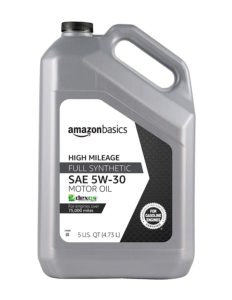When you go to a quick lube place or mechanic garage for an oil change, you are probably asked which oil you’d like for your car. Does it simply mean you want to pay more for synthetic oil or less for conventional oil? What is exactly the difference? What’s the important factor of using synthetic motor oil vs. conventional motor oil?

What are Synthetic oil and Conventional oil?
Synthetic oil is artificially created engine lubricant. Some synthetic oil started with conventional oil as a base then chemically altered. And some other type of synthetic oil is created from other raw materials. Conventional oil is naturally refined from crude oil. It’s also called standard oil or mineral-based oil.
Advantages of Synthetic oil over Conventional oil
Synthetic oil is thinner, but resists high and low temperatures better, and lasts longer than conventional oil. While recommended change interval of conventional oil is 3,000 to 5,000 miles, recommended change interval of synthetic oil is around 7,500 miles.
How much do they cost?
Synthetic oil can cost twice as much as conventional oil. However, you should take the longer interval into consideration. It can be cheaper because you don’t frequently pay the labor for oil change.
Do some cars requires synthetic oil?
Many late-models of European makes such as BMW, VW, Mercedes Benz, and Audi most likely require full synthetic oil. And newer Subaru, Honda, Toyota, and some high-performance vehicles also need to use synthetic oil. You can make sure of it by checking the owner’s manual. If the owner’s manual says synthetic oil is required, you should follow that. Otherwise, you may lose warranty coverage.
Should I use Synthetic oil or Conventional oil?
If your owner’s manual doesn’t mention about use of synthetic oil, is it still worth using synthetic oil for your car? You should consider two things.
First, how often you prefer to change the oil. If you are lazy and tend to postpone the oil change, you’d better use synthetic. As mentioned above, synthetic oil can last longer than conventional oil. A short life of conventional oil may break down while you postpone the oil change, and it may cause an expensive repair in the future.
Second, it depends where you drive. If you live in a place with extreme temperatures, you should use synthetic oil. In severe weather, high or low temperature, Synthetic oil maintains its viscosity better than conventional oil. It’s one of the reasons synthetic oil has been developed in the first place.
Conclusion

To find out which oil is the better for your car, you should check your owner’s manual first. Then, think about climate or weather of the area you drive and take this into consideration. And also ask yourself if you are strict about the oil change interval. Regardless of choice, oil change is one of the most important maintenance jobs. You should never neglect it. It must be done regularly.
